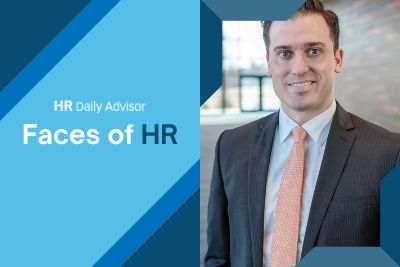Before Jeff Ostermann got his start in the HR industry, he held various finance and business leadership roles at Fortune 500 companies. Now with nearly three years of skin in the HR industry, Ostermann says stepping into a Chief People Officer role was a “natural evolution.”
“Throughout my prior business career, I had always been focused on adding value through developing people and building high-capacity teams, so stepping into a CPO role was a natural evolution of this,” he recently shared with HR Daily Advisor.
Ostermann is Chief People Officer at Sweetwater, the #1 online retailer of music instrument and professional audio gear in the United States. In his role, he develops the talent, teams and culture that help Sweetwater serve its customers and grow its impact on music-makers in the U.S. and worldwide.
“The scope of my responsibilities includes talent acquisition, organizational design, talent management, talent analytics, total rewards, well-being, learning and development, and diversity and inclusion,” Ostermann explained. “My approach to HR is to treat it very much like its own business unit. Our HR team members deliver products and services to our customers, and we must continually do so at a high level. Our customers just happen to be employees, candidates, and their families.”
In our latest Faces of HR, meet Jeff Ostermann.
Who is/was your biggest influence in the industry?
I can’t necessarily identify one key person within HR that has shaped me. But I’ve been shaped throughout my career by gathering insights on work and life from a variety of sources and writers including C.S Lewis, Tim Keller, Patrick Lencioni, and Stephen Covey.
What’s your best mistake and what did you learn from it?
Very early in my career, I was dramatically called out by a family member of a colleague for having made some overly critical and negative comments about my coworker. I took the feedback to heart and decided at that moment that I would not speak anything about anyone that I wouldn’t be comfortable sharing with them directly.
What’s your favorite part about working in the industry? What’s your least favorite part, and how would you change it?
I love being able to positively impact our employees and their families – to see the joy and sense of purpose that someone can gain when they are aligned to work and to an environment that brings out the best of who they are.
My least favorite part is in recognizing that we can’t always provide everything someone needs to find their best path for their work and life. Sometimes we just aren’t a match for the environment that someone is looking for but when that happens, we work hard to help them discover a better option.
It sounds like through your experience you really care about people, and you want to help them feel safe and comfortable, which is important in the industry. Please elaborate here.
Absolutely! Especially in today’s world, many people can be skeptical of organizations. They’ve had past bad experiences or been burned by people or companies that didn’t treat them well. My hope is that we can create an environment where our employees realize they are deeply cared for and that then frees them to deliver their best work. Of course, this doesn’t mean that we’ll always agree on everything or that we can meet every possible need someone may have (an employer can only do so much) – but at a fundamental level, the sum of our efforts should send a signal that we are here for our employees who are serving the customers who count on us. We expect our employees to work hard for our customers so we in turn should do our best for them.
How can company leaders make HR a value within their organization?
HR leaders need to continually hold themselves to a standard of service excellence mirroring that of the best organizations in the world. If we are taking the time to deeply understand our customers and ensure we are delivering outstanding value – all while helping them tackle and solve their most pressing issues, then how can we not be valued? In the past where I’ve seen HR undervalued, it’s often because the HR team is reactively waiting to be told what to do or what problem to solve – not proactively anticipating issues and driving the business forward.
Where do you see the industry heading in five years? Or are you seeing any current trends?
I believe HR professionals are better positioned than ever to make a strategic difference in their organizations – but they must step up to seize the moment. They must also ensure they have the broad-based skills to handle a seat at the table when the opportunity presents itself. I believe organizations will increasingly be looking for HR leaders who have experience outside of a narrow HR vertical. The speed and complexity of decisions facing businesses today simply require leaders who can draw from both a depth and breadth of insights.
What are you most proud of?
I am most proud of being able to operate with a strong balance between my home and work life. As important as leading an organization is, my family means more. We need more leaders who visibly demonstrate this balance, so employees are empowered to do the same. The organizations that champion this will be the best positioned to attract high level talent that values people over performance. Perhaps somewhat paradoxically they will then end up creating more long-term value in both areas.
Do you have any advice for people entering the profession?
Roll up your sleeves and dive in. Embrace opportunities to take on the messy work and the hard projects. Figure out how to make your boss’s life better and pathways will open for you.


